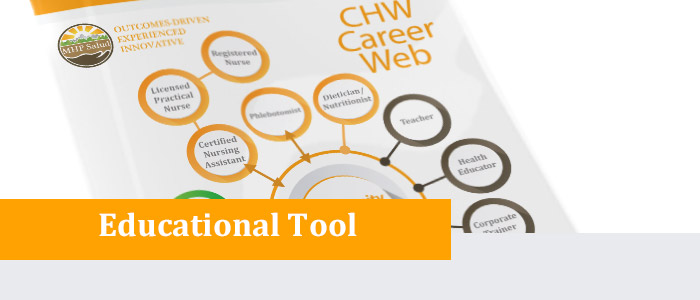Careers in Health, Education, and Social Work Spotlight
Published September 2020 | Back to all news and updates
Community Health Workers Have Many Career Paths
The unique nature of work performed by Community Health Workers (CHWs) allows them to cross over into many different career paths. Typically, the progression from one career to the next is visualized as a “career ladder” which describes climbing upwards towards a better or higher-paying position. However, because the skillset required of a CHW overlaps with skillsets required from many other professions, a CHW’s career movement cannot solely be described as going “up” and “down” or being better or worse.
Rather, a “career web”, which allows for movement in many directions, better depicts the idea that there are a variety of different paths that can lead an individual into and out of the CHW profession.
Although there are different career paths for a CHW, many people have vibrant and successful careers as lifelong CHWs. As with all things in the workforce, longer experience in a role often increases how effective an individual is in that role.
Each month, we highlight the journey of an individuals’ professional development into roles within and outside of the CHW profession. This month’s story is about Cynthia’s journey from CHW to Advocate. It illustrates how the CHW profession builds skillsets that are desirable across industries.
Cynthia’s Story: From Community Health Worker to Advocate

Cynthia had been a CHW for over ten years. She had experience working at both non-profits and health centers. She enjoyed working as a CHW and always had a passion for being a voice for the community. She had been in the CHW role for a long time and while she was passionate about the work, she desired to find something to further her professional development. She decided to look into other professions, like health educator, nursing, and social work. None of the roles she was seeing seemed like the right fit for her. Additionally, many of the roles required schooling or added credentials and she was not ready to go back to school. A few weeks went by and she was talking to a fellow CHW about her predicament. Her colleague told her that she should join the state’s CHW association. Her time with the association would be unpaid but would allow her to advocate for the CHW profession while also developing her skills. She was very interested in becoming a CHW advocate and not concerned about the lack of pay since she was paid well in her current role.
Cynthia went onto the state association’s website to set up an account and get in contact with someone in the organization. She ended up setting up a meeting with the association’s director and they recommended that she join one of their workgroups. The director explained they meet once a month and provide an excellent opportunity to advocate for the CHW profession and community. Following their conversation, Cynthia decided to attend the first meeting to get an idea if it would be a good fit for her. She ended up enjoying the workgroup and the fact that she could meet other CHW advocates too. Over the next couple of years, she advocated for many policy changes for CHWs, including certification, funding, and recognition.
Note these stories are based on real-life scenarios but contain fictional characters.
Download the CHW Career Web Model Resource for free!

Our CHW Career Web Model resource demonstrates the numerous ways that an individual can find themselves becoming a CHW or how they may progress their career under various ‘career clusters’ like social work, clinical, or advocacy after being a CHW. The resource can be used as a tool by organizations that work with CHWs such as community-based organizations, CHW Associations, Federally Qualified Health Centers (FQHCs), Primary Care Associations (PCAs), and Area Health Educations Centers (AHECs) to help explain the different career trajectories those in the CHW workforce have.
Blog Topics
About MHP Salud

MHP Salud has over 35 years of experience implementing CHW programs and training organizations looking to start and/or strengthen their own CHW programs. Visit our CHW Training & Consulting Services page to learn more about how we can help.






